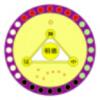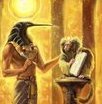-
Content count
1,996 -
Joined
-
Last visited
-
Days Won
6
About Zhongyongdaoist
-
Rank
Dao Bum
Recent Profile Visitors
-
As a first response to the above I will post an early post on this topic: Earlier in this thread I posted here: http://thetaobums.com/topic/26014-holy-guardian-angel/?p=388183 and here: http://thetaobums.com/topic/26014-holy-guardian-angel/?p=388370 references to material that predates Crowley and is contemporaneous with Abramelin and some that goes back to Antiquity. I have been rather busy of late and have not been able to return to this thread, though I have thought about enlarging upon the material above. I may be able to put some time in the matter shortly and would particularly like to address the confusion between the Higher Self and the Holy Guardian Angel. The two links above reference much longer discussions that appeared earlier in that thread. I hope that you find the material interesting and informative. If I have time I will write more based on more recent study and experience. ZYD
- 64 replies
-
- 1
-

-
- holy guardian angel
- hga
-
(and 1 more)
Tagged with:
-
Hello DBT, Welcome to Dao Bums. I sometimes humorously refer to myself as a Confucian NeoPlatonist. Your description of your own studies in this area remind me very much of my own, with interest in Magic, Martial arts and other odd and obscure studies going back to my late childhood. I was probably one of the few twelve year olds in Southern California with my own copies of Crowley's Magick in Theory and Practice and Waite's Book of Ceremonial Magic, among a few others, to thumb through. I don't have time to speak more of my childhood, much less the following sixty years here, though I have posted a little more elsewhere on Dao Bums, as well as many other things which you might find interesting. Sincerely, Zhongyongdaoist, AKA, ZYD, its easier to type.
-

Origins of dualistic thought in western hemispheres
Zhongyongdaoist replied to S:C's topic in Abrahamic Religions Discussion
You shouldn't leave ancient Egypt out of the running here, and as usual references to Plato are distortions that arise in part because of explanations given in scholarly work about how Plato contributed to Cartesian dualism, an ontological dualism that historically has more to do with the reintroduction of Epicureanism to European thinking than anything Plato said. Epicureanism by the way is proof that, as the ancestor to modern materialistic monism, monistic thinking is not good in itself. There is naturally a lot more that I could say about this, including that it is a good idea to define ones terms a little better than has been done here, though the type of Dualism that seems to be intended here is the type of moral dualism implied by distinctions between "Good" and "Evil", and not Descartes distinction between Mind and Matter. If I have time I will contribute further to the discussion. ZYD -

Synesius of Cyrene
Zhongyongdaoist replied to SirPalomides's topic in Abrahamic Religions Discussion
There is more to Synesius than Platonic disagreements with Christian dogma. This is an abstract from an article on Synesius: Synesius of Cyrene and the American “Synesii” I haven't read the article yet because I only just came across it, but I will try to get a look at it shortly. He also wrote a book on dreams and their spiritual meaning which can be down loaded here: Synesius on Dreams ZYD -

Jesus in India ( Himalayas)
Zhongyongdaoist replied to Chang dao ling's topic in Abrahamic Religions Discussion
This post of mine should be read in the light of the previous three, and then the following article link which I found looking for things which might make some of this clearer should be followed it gives some insight into Plato's influence which even survives into the present day, such as St. Valentine's Day, and its medieval precursor Courtly Love: The Ancient Story at the Origin of Modern Romantic Love The famous "Ladder of Love" is the crowning glory of Plato’s Symposium. " Jesus may have spoken Greek and might have come under the direct or indirect influence of Platonism. But even if he did not, the later Church sought to align Christian theology with classical philosophy—and Christian love, more properly called charity, and originally directed at God, began to blur with something much more individualistic." Ideas like these occurred to me in the early 80s after I first read Plato's Symposium and his Phaedrus. I hope this gives some insight into Plato's long lasting influence, which certainly influenced Hellenistic Judaism. ZYD -

Jesus in India ( Himalayas)
Zhongyongdaoist replied to Chang dao ling's topic in Abrahamic Religions Discussion
Finally, I will add this short discussion of Plato's quasi Tantric doctrine of Liberation through Eros: Of particular relevance to this thread are the dialogues which contain concepts which can only be described as “proto-tantric” in the sense of harnessing Eros to the task of spiritual development. To go back to another quote from ralis: Well, Plato gives teachings which he claims will liberate one from rebirth in three lifetimes. Who would have thought? Certainly not 99.44% of the people to whom I bring up the idea of Plato as a source of “mystical” doctrines. Of course it is possible that the "full enlightenment" mentioned above may not be the same as freedom from rebirth. By the way, I don't necessarily accept or reject either claim. Claims of freedom from rebirth like like those of immortality, which end when you die, end when you are reborn, and there really is no way to evaluate them. I have added the emphasis above which is not in the original. ZYD -

Jesus in India ( Himalayas)
Zhongyongdaoist replied to Chang dao ling's topic in Abrahamic Religions Discussion
Here is the longer post which I promised to post above: The one category of enlightened people is able to comprehend God through a vision beyond the physical universe. It is as though they advanced on a heavenly ladder and conjectured the existence of God through an inference (Praem. 40). The other category apprehends him through himself, as light is seen by light. For God gave man such a perception "as should prove to him that God exists, and not to show him what God is." Philo believes that even the existence of God "cannot possibly be contemplated by any other being; because, in fact, it is not possible for God to be comprehended by any being but himself " (Praem. 39-40). Philo adds, "Only men who have raised themselves upward from below, so as, through the contemplation of his works, to form a conjectural conception of the Creator by a probable train of reasoning" (Praem. 43) are holy, and are his servants. Next Philo explains how such men have an impression of God's existence as revealed by God himself, by the similitude of the sun (Mut. 4-6) a concept which he borrowed from Plato. As light is seen in consequence of its own presence so, "In the same manner God, being his own light, is perceived by himself alone, nothing and no other being co-operating with or assisting him, a being at all able to contribute to pure comprehension of his existence; But these men have arrived at the real truth, who form their ideas of God from God, of light from light" (Praem. 45-46). As Plato and Philo had done, Plotinus later used this image of the sun. Thus the Logos, eternally created (begotten), is an expression of the immanent powers of God, and at the same time, it emanates into everything in the world. (Emphasis mine, ZYD) Here we see important ideas and images that appear in both orthodox and Gnostic thought, such as the Logos, Trinity, light etc., and this is hardly an single icicle from the tip of the iceberg. I hope that these rather long excerpts are helpful. I hope that this and the post above it are helpful ZYD -

Jesus in India ( Himalayas)
Zhongyongdaoist replied to Chang dao ling's topic in Abrahamic Religions Discussion
I had originally thought I might comment in this thread but I have been busy and as I have watched it grow into an unwieldy pile of nonsense I have been less and less likely to do so, but since SirPalamedes has been generous enough to cite me as someone who might be able to shed light on Platonism in the period I will post something that I had thought of a while back as a possible contribution: I have added emphasis to the above, the links in it are important and I also decided that I would also post an excerpt from a longer post in the same thread which deals in particular with Philo of Alexandria. I will follow this post as quickly as possible. ZYD -

Jesus in India ( Himalayas)
Zhongyongdaoist replied to Chang dao ling's topic in Abrahamic Religions Discussion
The whole problem with this topic is that it is based on the flimsiest speculation which is then elaborated on in ways that are anachronistic and largely ignorant of what was going on in Judea and the larger Jewish world during the period that Jesus lived. I have made a lot of posts about the period and I will do some searching and pull them together for posting here. I am busy today, but I should have something to say by tomorrow. ZYD -
Well, since I have been mentioned already, my formal presence here may not be amiss. In my introductory post: Hello, they tell me I can do stand-up... I had this to say about my studies: Since a lot of posts, complete with pretty pictures, have been made since my name was first mentioned, it may take me a bit to orient myself and see how and where I might be able to add something useful or interesting and preferably both. ZYD
-
If by Zhong, you mean me, I prefer ZYD, as I note in my signature "Zhongyongdaoist AKA ZYD it's easier to type", aside from that, thank you for your generous appraisal of my contributions to the thread. In one of my posts in this thread I bring up the notion of "formal cause" and I want to expand on it a little bit because it is a very important concept useful in thinking about both Chinese and Western traditions: And In traditional Western magic as expounded in the work of Cornelius Agrippa for example, the idea of Formal Cause is central to the doctrine of "Occult Virtues" an aspect of the tradition much neglected by the Nineteenth Century revival of magic. In a post which I made sometime back I examine this in detail: and related to such Daoist concepts as Wuwei here: As the above posts develop they examine the idea of Formal Cause and how it relates to the topics. I hope these posts will be interesting and informative. ZYD
-
Here is something else to make time for: I focused on Information theory specifically after reading Bernard d'Espagnat's 1979 Scientific American article: The Quantum Theory and Reality, which brought home to me the mystery and importance of entanglement. I hadn't thought about it much since high school and then had reached a primitive pilot wave model for quantum mechanics, however, d'Espanat's article revealed the short comings of such an approach. Though the newer approach of quantum steering seems to me to be very promising and also very compatible with the notion of formal causes. If you, or other Dao Bums are interested there is a more technical introduction here: Quantum Steering: Practical Challenges and Future Directions This is the abstract: I hope this the above is interesting and informative. ZYD
-
I was happy to see Infolad1 back and posting his usual interesting posts, in this case emphasizing information theory: I have posted on the importance of information theory before, but there hasn't been much interest in such things for a while, many of our more scientific types left in the "Great Schism", fortunately some have returned. Here is one of my posts in which I bring point out what I consider an important aspect of information theory: Yes, very nice iain, what it has to do with akasha is another thing entirely, but that there is some relation to traditional concepts is certainly a possible extrapolation, and I would like to point out another traditional concept for which there is ample, what we might call meta-evidence, and that is the concept of "Formal Cause", a concept put forward by Aristotle, but strongly related to Plato's "Doctrine of Ideas". In his essay "Concepts of Cause in the Development of Physics", which can be found in a collection of his essays The Essential Tension, starting on page 21, Thomas Kuhn argues that while the notion of "formal causes" was explicitly rejected by the nascent "Scientific Revolution" in the Seventeenth Century, it has consistently worked its way back into physics in the progressive mathematization of physics since 1700. The interesting thing is that this reintroduction of formal causes as mathematics actually moves the concept more in the direction of Plato than Aristotle would have liked. I looked seriously at the implications of the double split experiment back circa 1980 and it was one of my reasons for adopting Platonism as my general working model of the world. I also made a conjecture at that time that information theory (in a sense an instantiation of Plato's "ideas") would allow the unification of physics which would solve the particle/wave problem. Physics has certainly opened up in that direction, but it has a ways to go. I hope this is interesting and informative. ZYD
-

Did you know that history's greatest scientists
Zhongyongdaoist replied to Sanity Check's topic in Esoteric and Occult Discussion
Sorry, but I was in a rush and the matter is basically trivia, and not something to which I devote the type of time and energy which I put into my serious posts. So on his 431st, Birthday Cornelius Agrippa was scientist of the day. ZYD -

Did you know that history's greatest scientists
Zhongyongdaoist replied to Sanity Check's topic in Esoteric and Occult Discussion
I read this book decades ago. From my own understanding of laboratory alchemy and the description in the book of Newton's alchemy he was quite wrong in his approach, but I don't wish at this time too get into a more detailed response on that, though if enough people are interested when I have time I may expand on this matter. As an amusing coincidence I was doing a search on Agrippa today and discovered that on this libraries site, Cornelius Agrippa was the "Scientist of the Day". I don't know if the link will change tomorrow, but I did want let everyone know that he was so honored today. Linda Hall Library News Scientist of the Day Cornelius Agrippa ZYD






















